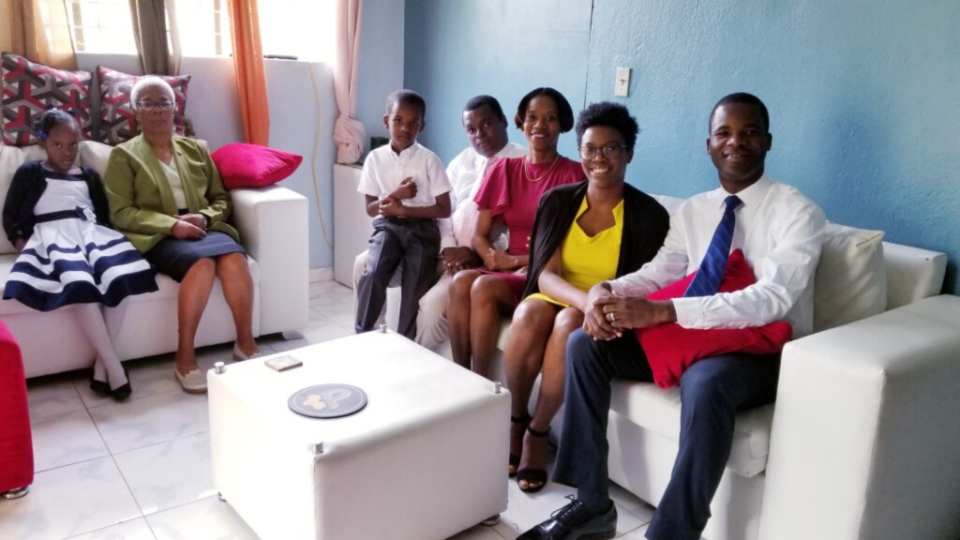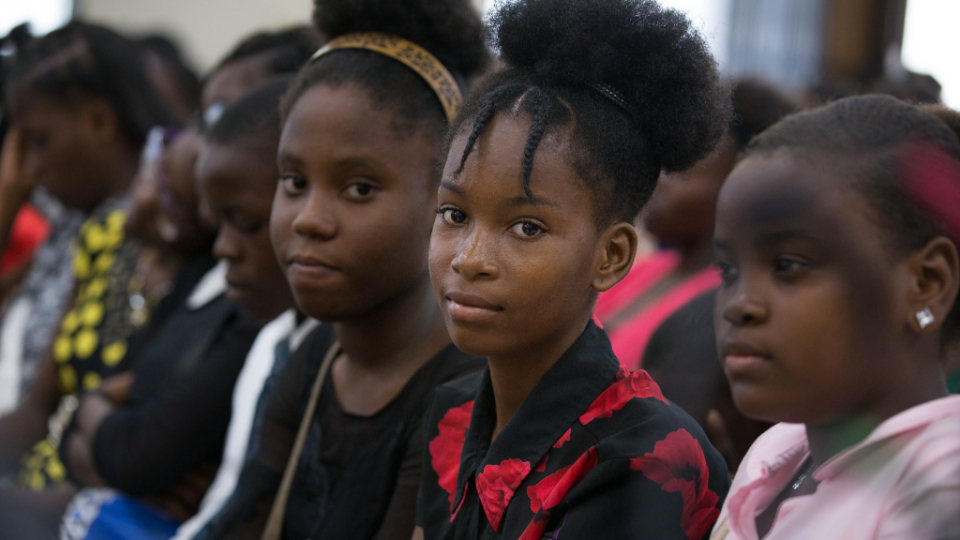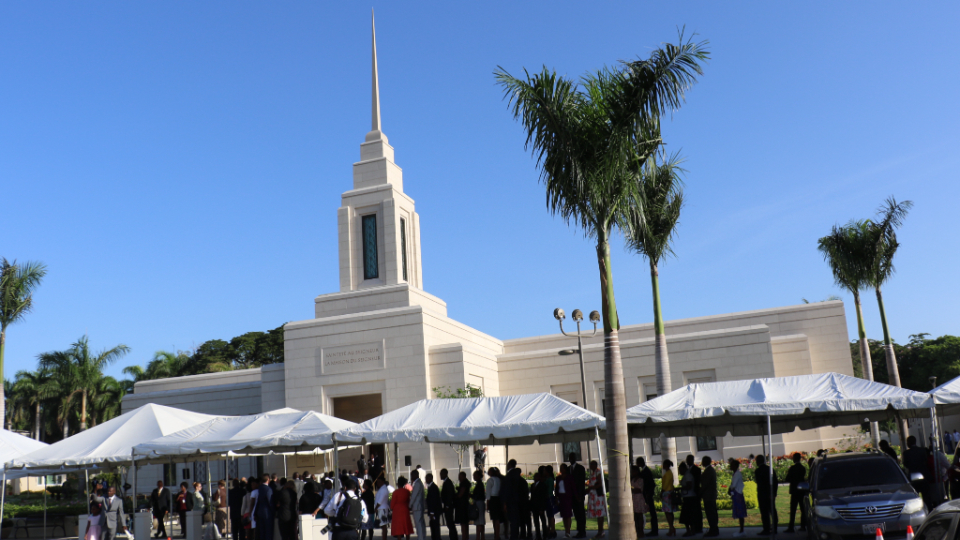
Haiti-Faith
From left, Leopold Clavaroche Cherenfant, Mike Hala J. Cherenfant, Nounesse C. Cole, Steeve Cole, Guardini Cole, Marie Josée Lainé Cherenfant and Fahife Cole, of the Carrefour-Feuilles Ward, Port-au-Prince Haiti Stake, watch the Sunday morning session of general conference on April 4, 2021. Haitian Latter-day Saints continue to rely upon one another during ongoing political and economic struggles in the Caribbean nation. Photo courtesy of Leopold Clavaroche Cherenfant, courtesy of Church News.All rights reserved.This story appears here courtesy of TheChurchNews.com. It is not for use by other media.
By Jason Swensen, Church News
Ongoing political unrest in Haiti has snagged global headlines and compounded the daily challenges facing Latter-day Saints in the Caribbean nation — including poverty, crime and, of course, the COVID-19 pandemic.
Haiti President Jovenel Moïse was assassinated on July 7, 2021, adding to the volatility in the country.
But amid uncertainty and fear, Church members in Haiti are finding day-to-day strength by looking out for one another and holding tight to the gospel. Approximately 24,000 Latter-day Saints live in Haiti.
“With the magnificent leadership of two Area Seventies (Elder Hubermann Bien-Aimé and Eldeer Paul H. Jean Baptiste) and working in council with stake leaders, mission leaders and temple leaders, the [Haitian] Saints are facing the challenges with five ‘pillars’ or ‘focuses,’” Elder Jose L. Alonso, Caribbean Area president and General Authority Seventy, wrote in an email to the Church News.
Staying connected with one another is the first pillar. There is no reason for anyone to face the day’s challenges alone.
“A strategy has been designed for leaders and members to maintain good communication to notify of challenging situations, as well as for them to receive guidance, based on prophetic direction, on how to act before such circumstances,” Elder Alonso noted. “We have found that good communication reduces tension, increases trust and facilitates inspiration.”
Second, Haitian Latter-day Saints are embracing self-reliance principles. Extreme poverty has defined the island nation for decades. It is generally classified as the poorest country in the Western Hemisphere.
“However, leaders and members have been participating in different self-reliance workshops and also have been working for some years to become, to the best of their ability, self-reliant and not totally dependent,” Elder Alonso wrote. “Thus, of the little they have, they store as much as they can and, when there are critical situations, they seek to meet their needs — and, if possible, they support others.”

Haiti-Faith
Haitian youth listen to Elder David A. Bednar of the Quorum of the Twelve Apostles and his wife, Sister Susan Bednar, speak during a special youth devotional on Saturday, August 31, 2019, prior to the dedication of the Port-au-Prince Haiti Temple on Sunday, September 1, 2019.2021 by Intellectual Reserve, Inc. All rights reserved.Resources from the bishops’ storehouse system and other humanitarian organizations are also being utilized when necessary.
Third, opportunities to share the gospel continue.
All of the full-time missionaries serving in the Haiti Port-au-Prince Mission are native Haitians. When challenges arise, they remain alert to notifications from their mission leaders and exercise care and common sense.
“[The missionaries] all have a food-and-water reserve for at least three weeks,” Elder Alonso noted. “We have this practice because we do not know when a difficult situation will arise, so this practice is constant throughout the mission.
“Despite the pandemic and the lack of infrastructure in the country … the preaching of the gospel is moving forward steadily, and we are confident that many more will hear the message of the Restoration and will accept the invitation to come and see, come and help, and come and stay.”
The fourth pillar is to love God and love one’s neighbor.
“Attending church regularly, partaking of the sacrament and ministering to others are ways of showing our love for God and our neighbor,” Elder Alonso wrote.
Even prior to the pandemic, Church meetings in Haiti were occasionally shifted to homes because of political instability or fuel shortages.
“The prophetic direction of ‘home-centered and Church-supported’ was not uncommon for the Saints in Haiti when it was announced,” Elder Alonso wrote. “So by following prophetic direction and the direction of the local leaders, all the leaders in the wards and branches know what to do and how to organize if [conditions do not allow] for Sunday meetings in person.”
Young Latter-day Saints in Haiti also continue to enjoy opportunities outlined by the Church’s Children and Youth program to serve one another and strengthen friendships.

Haiti-Faith
Hundreds wait to enter the Port-au-Prince Haiti Temple for the dedication on September 1, 2019. Photo courtesy of Jason Swensen, courtesy of Church News.All rights reserved.The fifth pillar is temple and family history work. The Port-au-Prince Haiti Temple remains a symbol of God’s love for His children in the Caribbean nation.
The Port-au-Prince Haiti Temple is currently paused due to local COVID-19 conditions and precautions, a move made in early June. On June 12, the temple was upgraded from its previous Phase 2-B status, which allows proxy baptisms with all living ordinances, to Phase 3, expanding to all proxy ordinances when the temple resumes operations.
“For the members of the Church in Haiti, family history work and serving in the temple is something they take very seriously,” Elder Alonso wrote. “They attend the temple as much as their economy and the safety of the roads allow.
“Even for nonmembers, the temple is a site that represents God’s love for the Haitian people — and to some extent, a protection for the country. The Saints in Haiti love the temple. They serve in it and make every sacrifice possible to attend.”
By focusing on those five “pillars,” Elder Alonso added, Latter-day Saints in Haiti can “move forward with faith in Christ for a better future.”
Copyright 2021 Deseret News Publishing Company